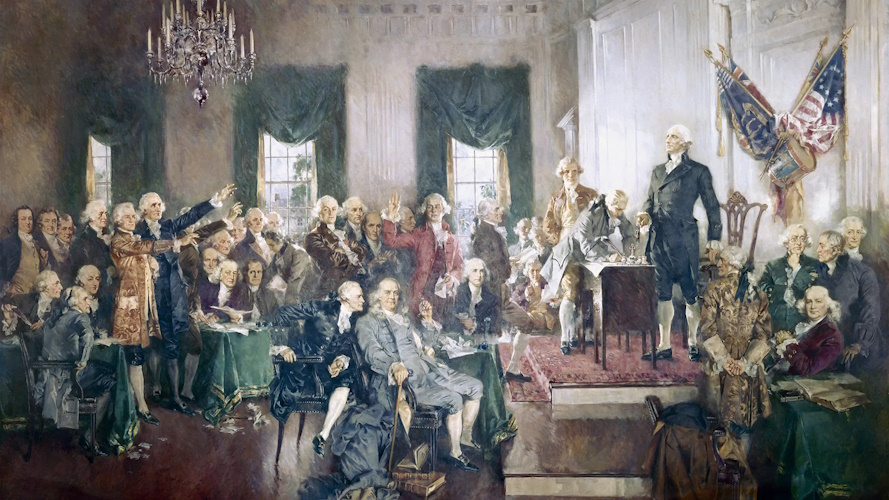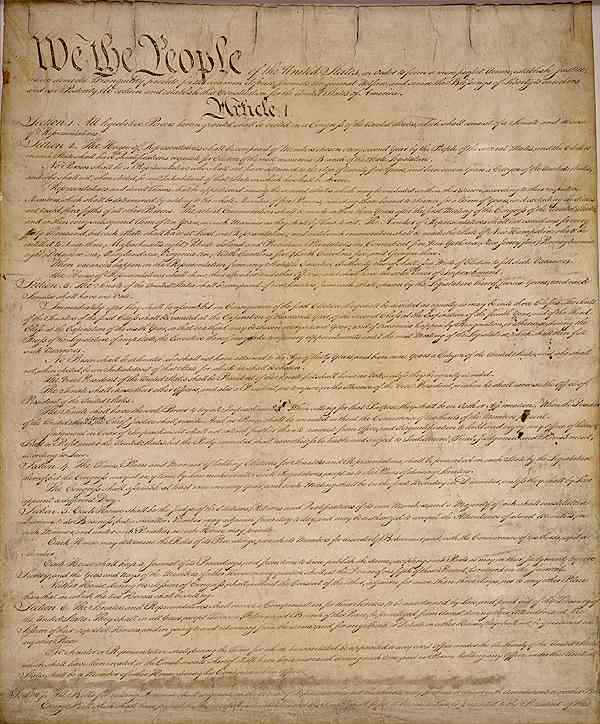
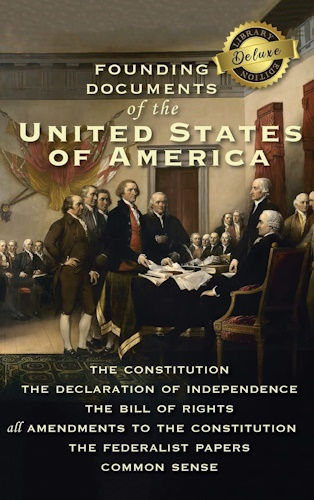
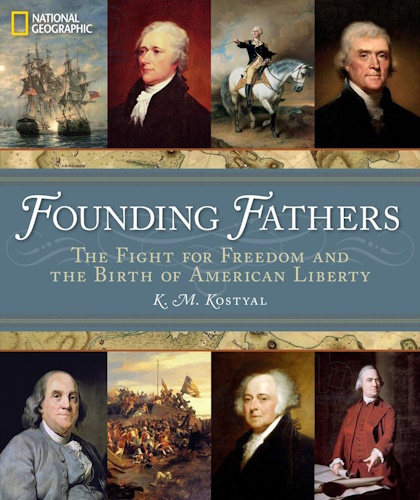
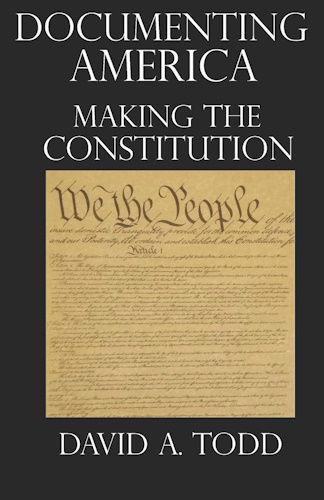


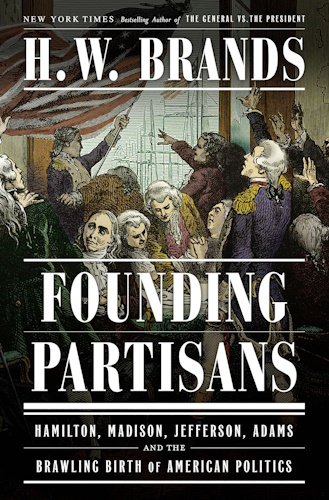
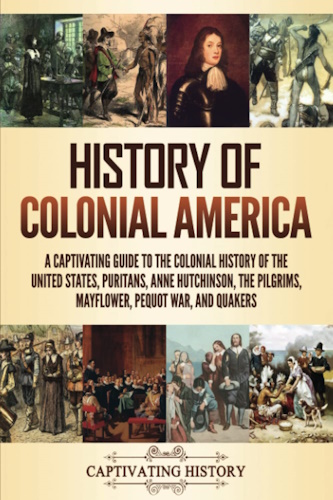
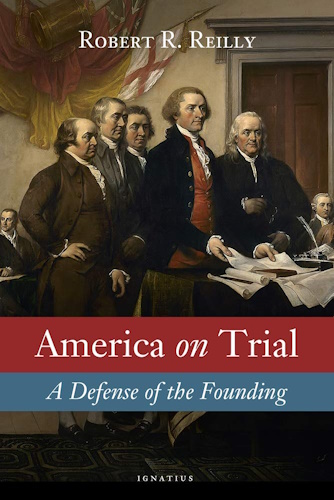
The Constitution For The United States
Its Sources and Its Application
by Thomas James Norton
(Retrieved from archive.org)
The research, work, and dedication
Of
Barefoot Bob Hardison
August 8th, 1933 - January 31st, 2009
![]()
The Constitution For The United States
Its Sources and Its Application
Contents
Preamble
Article 1
Article 2
Article 3
Article 4
Article 5
Article 6
Article 7
Ratification
1st 12 Amendment Proposals
"Bill of Rights" Amend. I - X
Amend. XI -XXVII
Missing Original 13th Amendment
Letter of Transmittal
Landmark Court - Case Index
Constitution History
A Quiz for Loyal Americans
Index
Ratification
How the Constitution Was Ratified
The course of the thirteen States in ratifying the new Constitution presents an interesting study:
| State | Ratification | Rank | Unanimous | Affirm | Oppose | Text of Ratification |
| Delaware | Dec. 7, 1787 | Delaware Text | ||||
| Pennsylvania | Dec. 12, 1787 | Pennsylvania Text | ||||
| New Jersey | Dec. 18, 1787 | New Jersey Text | ||||
| Georgia | Jan. 2, 1788 | Georgia Text | ||||
| Connecticut | Jan. 9, 1788 | Connecticut Text | ||||
| Massachusetts | Feb. 6, 1788 | Massachusetts Text | ||||
| Maryland | Apr. 28, 1788 | Maryland Text | ||||
| South Carolina | May 23, 1788 | So Carolina Text | ||||
| New Hampshire | June 21, 1788 | New Hampshire Text | ||||
| Virginia | June 25, 1788 | Virginia Text | ||||
| New York | July 26, 1788 | New York Text | ||||
| North Carolina | Nov. 21, 1789 | No. Carolina Text | ||||
| Rhode Island | May 29, 1790 | Rhode Island Text |
The small State of Delaware, having had its great fear dispelled by the guarantee of a vote in the Senate equal to that of the largest, quickly led in ratifying the Constitution.
In the ratifying convention of Massachusetts there was strong opposition to those clauses of the Constitution11, 61, 121 which made concessions to slavery. And there was dislike of the clause136 forbidding a religious test for the person holding office. While a bill of rights also was desired, Massachusetts set the good example of ratifying "in full confidence that the amendments proposed will soon become a part of the system," as they did.
Ratification by South Carolina destroyed the hope of some Virginians for a separate confederacy of southern States. They were opposed to the National powers granted by the Constitution.
On July 2 Congress received word that the ninth State had ratified. In September it fixed the first Wednesday in January, 1789, for the choice of electors, the first Wednesday in February for balloting for a President and a Vice President, and the first Wednesday in March (March 4, as it happened and as the date remained until 1933) for the commencement of the new government.
In addition to opposing a strong National government as against the dominance of the State, Virginians, led by Patrick Henry, objected to the clause 71 preventing a State from impairing the obligation of a contract. At that time Virginian planters owed to English merchants over ten million dollars and the legislature of Virginia had suspended their right to sue for their money in the courts of that State.
New York, in the port of which more than one half of the goods consumed in Connecticut, New Jersey, Vermont, and western Massachusetts paid duties or other taxes, stubbornly opposed the Constitution because of the commerce clause.45 Opposition in the ratifying convention was led by Governor Clinton. In support of the Constitution the imperishable "Federalist" papers were written by Hamilton, Madison, and Jay. Chief Justice Morris and Chancellor Livingston aided in the struggle for the Constitution.
North Carolina did not enter the Union until after the new government was well on its way. The first convention (July, 1788) refused, by a vote of 184 to 84, to ratify the Constitution because of the lack of a Bill of Rights and in the fear that the strong National government would in time overbear State authority.
Rhode Island, which did not send delegates to the Constitutional Convention, and which long refused to ratify, knocked at the door for admission after the new government began to deal with it as a foreign country and subjected it to taxes on its exports.
TO THE FEDERAL CONGRESS
DELAWARE (not yet received or located in archives)
PENNSYLVANIA
Ratification of the Constitution by the State of Pennsylvania
December 12, 1787.
In the Name of the People of Pennsylvania
Be it Known unto all Men that We the Delegates of the People of the Commonwealth of Pennsylvania in general Convention assembled Have assented to, and ratified, and by these presents Do in the Name and by the authority of the Same People, and for ourselves, assent to, and ratify the foregoing Constitution for the United States of America. Done in Convention at Philadelphia the twelfth day of December in the year of our Lord one thousand seven hundred and eighty seven and of the Independence of the United States of America the twelfth. In witness whereof we have hereunto subscribed our names.
Frederick Augustus Muhlenberg President
Thomas Cheyn
John Hannum
Stephen Chambers
Robert Coleman
Sebastian Graff
John Hubley
Samuel Ashmead
Enoch Edwards
Henry Wynkoop
John Barclay
Thos Yardley
Abraham Stout
Thomas Bull
Anthony Wayne
George Latimer
Benjn Rush
Hilary Baker
James Wilson
Thomas McKean
W MacPherson
John Hunn
George Gray
Jno Allison
Jonathan Roberts
John Richards
James Morris
Timothy Pickering
Benjn Elliot-
Stephen Balliet
Joseph Horsfield
David Dashler
William Wilson
John Boyd
Tho Scott
John Nevill
Jasper Yeates.
Heny Slagle
Thomas Campbell
Thomas Hartley
David Grier
John Black
Benjamin Pedan
John Arndt
William Gibbons
Richard Downing
NEW JERSEY
The New Jersey State Archive has one of the two original copies of NJ's ratification. On four large sheets of parchment, it contains the text of the Constitution and the signatures of the state convention delegates approving it.
So far as is known there was no other transmittal letter. The minutes of the convention read:
"Resolved, That the Ratification of the Federal Constitution as agreed to, and signed by this Convention, be delivered by the President of this Convention [John Stevens] to the President of Congress in Congress assembled.", dated December 19, 1787.
GEORGIA (not yet received or located in archives)
CONNECTICUT (not yet received or located in archives)
MASSACHUSETTS
COMMONWEALTH OF MASSACHUSETTS.
In Convention of the Delegates of the People of the Commonwealth of Massachusetts, 1788.
The Convention, having impartially discussed and fully considered the Constitution for the United States of America, reported to Congress by the Convention of delegates from the United States of America, and submitted to us by a resolution of the General Court of the said commonwealth, passed the twenty-fifth day of October last past; and acknowledging, with grateful hearts, the goodness of the Supreme Ruler of the universe in affording the people of the United States, in the course of his providence, an opportunity, deliberately and peaceably, without fraud or surprise, of entering into an explicit and solemn compact with each other, by assenting to and ratifying a new Constitution, in order to form a more perfect union, establish justice, insure domestic tranquillity, provide for the common defence, promote the general welfare, and secure the blessings of liberty to themselves and their posterity, DO, in the name and in behalf of the people of the commonwealth of Massachusetts, assent to and ratify the said Constitution for the United States of America.
And, as it is the opinion of this Convention, that certain amendments and alterations in the said Constitution would remove the fears and quiet the apprehensions of many of the good people of the commonwealth, and more effectually guard against an undue administration of the federal government, the Convention do therefore recommend that the following alterations and provisions be introduced into the said Constitution: -
First. That it be explicitly declared, that all powers not expressly delegated by the aforesaid Constitution are reserved to the several states, to be by them exercised.
Secondly. That there shall be one representative to every thirty thousand persons, according to the census mentioned in the Constitution, until the whole number of representatives amounts to two hundred.
Thirdly. That Congress do not exercise the powers vested in them by the 4th section of the 1st article, but in cases where a state shall neglect or refuse to make the regulations therein mentioned, or shall make regulations subversive of the rights of the people to a free and equal representation in Congress, agreeably to the Constitution.
Fourthly. That Congress do not lay direct taxes, but when the moneys arising from the impost and excise are insufficient for the public exigencies, nor then, until Congress shall have first made a requisition upon the states, to assess, levy, and pay their respective proportion of such requisitions, agreeably to the census fixed in the said Constitution, in such way and manner as the legislatures of the states shall think best, and, in such case, if any state shall neglect or refuse to pay its proportion, pursuant to such requisition, then Congress may assess and levy such state's proportion, together with interest thereon, at the rate of six per cent. per annum, from the time of payment prescribed in such requisitions.
Fifthly. That Congress erect no company with exclusive advantages of commerce.
Sixthly. That no person shall be tried for any crime, by which he may incur an infamous punishment, or loss of life, until he be first indicted by a grand jury, except in such cases as may arise in the government and regulation of the land and naval forces.
Seventhly. The Supreme Judicial Federal Court shall have no jurisdiction of causes between citizens of different states, unless the matter in dispute, whether it concern the realty or personalty, be of the value of three thousand dollars at the least; nor shall the federal judicial powers extend to any action between citizens of different states, where the matter in dispute, whether it concern the realty or personalty, is not of the value of fifteen hundred dollars at the least.
Eighthly. In civil actions between citizens of different states, every issue of fact, arising in actions at common law, shall be tried by a jury, if the parties, or either of them, request it.
Ninthly. Congress shall at no time consent that any person holding an office of trust or profit, under the United States, shall accept of a title of nobility, or any other title or office, from any king, prince, or foreign state.
And the Convention do, in the name and in the behalf of the people of this commonwealth, enjoin it upon their representatives in Congress, at all times, until the alterations and provisions aforesaid have been considered, agreeably to the 5th article of the said Constitution, to exert all their influence, and use all reasonable and legal methods, to obtain a ratification of the said alterations and provisions, in such manner as is provided in the said article.
And, that the United States, in Congress assembled, may have due notice of the assent and ratification of the said Constitution by this Convention, it is
Resolved, That the assent and ratification aforesaid be engrossed on parchment, together with the recommendation and injunction aforesaid, and with this resolution; and that his excellency, JOHN HANCOCK, President, and the Hon. WILLIAM CUSHING, Esq., Vice-President of this Convention, transmit the same, countersigned by the Secretary of the Convention, under their hands and seals, to the United States in Congress assembled.
MARYLAND (not yet received or located in archives)
SOUTH CAROLINA (not yet received or located in archives)
NEW HAMPSHIRE was the Ninth State to Ratify the Constitution,
thereby forever establishing the union of States as a Constitutional Republic
New Hampshire's Ratification Document: Transcription:
STATE OF NEW-HAMPSHIRE
IN CONVENTION of the Delegates of the PEOPLE of the STATE OF NEW HAMPSHIRE June 21st. 1788
The Convention haveing impartially discussed & fully considered the Constitution for the UNITED STATES OF AMERICA, reported to Congress by the Convention of Delegates from the United States of America and submitted to us by a Resolution of the General Court of said State, passed the fourteenth Day of December last past & acknowledging with grateful Hearts the goodness of the Supreme ruler of the Universe in affording the People of the UNITED STATES in the course of his Providence an Opportunity deliberately & peaceably without fraud or Surprize of entering into an explicit & solemn compact with each other by assenting to and ratifying a new Constitution, in Order to form a more perfect union, establish Justice, insure domestick tranquility, provide for the common defence promote the general welfare and secure the blessings of Liberty to themselves & their Posterity. DO IN THE NAME, & behalf of the People of the STATE OF NEW HAMPSHIRE assent to & ratify the said Constitution for the UNITED STATES OF AMERICA & as it is the Opinion of this Convention that certain amendments & alterations in the said Constitution would remove the fears and Quiet the apprehensions of many of the good People of this State, and more effectually guard against an undue Administration of the federal Government. The Convention do therefore recommend that the following Alterations & provisions be introduced into the said Constitution.
THAT it be explicitly declared that all Powers not expressly and particularly delegated by the aforesaid Constitution are reserved to the several States to be by them exercised.
First
THAT there shall be one Representative to every Thirty Thousand Persons according to the Census mentioned in the Constitution untill the whole number of Representatives amounts to two hundred.
SECONDLY
THAT Congress do not Exercise the Powers vested in them by the fourth Section of the first Article, but in Cases when a State shall neglect or refuse to make the regulations therein mentioned or shall make regulations subversive of the rights of the People to a free & equal Representation in Congress, nor shall Congress in any case make regulations contrary to a free and equal Representation.
THIRDLY
THAT Congress do not lay direct Taxes but when the money arising from Impost, Excise R their other resources are insufficient for the Publick Exigencies; nor then untill Congress shall have first, made a requisition upon the STATES to assess Levy and pay their respective proportions of such requisition agreeably to the Census fixed in the said Constitution in such way and manner as the Legislature of the State shall neglect then Congress may assess & Levy such State's proportion together with the Interest from the Time of payment prescribed in such requisition.
FOURTHLY
THAT Congress erect no Company of Merchants with exclusive advantages of Commerce.
FIFTHLY
THAT No Person shall be Tryed for any Crime by which he may incur an infamous punishment or loss of Life untill he be first indicted by a Grand Jury except in such Cases as may arise in the Government and regulation of the Land & Naval forces.
SIXTHLY
ALL Common Law Cases between Citizens of different States, shall be commenced in the Common Law Courts of the respective STATES and no appeal shall be allowed to the federal Court in such Cases, unless the sum or value of the thing in controversy amount to Three Thousand Dollars.
SEVENTHLY
IN Civil Actions between Citizens of different States, every issue of fact arising in Actions at Common Law, shall be Tried by a Jury if the parties or either of them request it.
EIGHTHLY
CONGRESS, shall at no time consent that any Person holding an Office of Trust or profit under the UNITED STATES shall accept a Title of Nobility or any other Title or Office from any King, Prince or foreign STATE.
NINTHLY
THAT no Standing Army shall be Kept up in Time of Peace, unless with the consent of three fourths of the Members of each branch of Congress nor shall Soldiers in Time of Peace be Quartered upon private Houses without the Consent of the Owners.
TENTHLY
CONGRESS shall make no Laws touching Religion or to infringe the rights of Conscience.
ELEVENTHLY
CONGRESS shall never disarm any Citizen, unless such as are or have been in actual Rebellion.
TWELFTHLY
AND THE CONVENTION DO, in the name & behalf of the People of this State enjoin it upon their REPRESENTATIVES in Congress at all Times untill the alterations & provisions aforesaid have been considered agreeably to the fifth Article of the said Constitution to exert all their influence & use all reasonable & legal methods to obtain a Ratification of the sd alterations & provisions in such manner as is provided in the said Article. And that the United States in Congress Assembled may have due notice of the assent & Ratification of the sd Constitution by this Convention. IT IS RESOLVED That the assent & Ratification aforesaid be engrossed on Parchment together with the recommendation & Injunction aforesaid & with this Resolution & that John Sullivan Esqr. President of Convention & John Langdon Esqr. President of the State Transmit the same Countersigned by the Secretary of Convention & the Secretary of the State under their hands & Seals to the United States in Congress Assembled.
s/ Jno Sullivan presidt of Convention
s/ John Langdon President of State
s/ John Calfe Secretary of Convention
s/ Joseph Pearson Secretary of State
One parchment original of this document is maintained by the Secretary of State at the Division of Records Management and Archives, Concord, NH. A second original parchment, probably that sent to the Confederation Congress in New York, is maintained by the National Archives and Records Administration, Washington, DC.
VIRGINIA
Properly titled "The Virginia Ratification of the Constitution of the United States"
Virginia, to wit:
We the delegates of the people of Virginia, duly elected in pursuance of a recommendation from the general assembly, and now met in convention, having fully and freely investigated and discussed the proceedings of the Federal Convention, and being prepared as well as the most mature deliberation hath enabled us, to decide thereon, Do, in the name and in behalf of the people of Virginia, declare and make known, that the powers granted under the constitution, being derived from the people of the United States, may be resumed by them whensoever the same shall be perverted to their injury or oppression, and that every power nor granted thereby, remains with them and at their will; and therefore no right, of any denomination, can be cancelled, abridges, restrained or modified by the congress, by the senate or house of representatives acting in any capacity, by the president or any department, or officer of the United States, except in those instances in which power is given by the constitution for those purposes; and that among other essential rights, the liberty of conscience and of the press cannot be cancelled, abridged, restrained or modified by any authority of the United States.
With these impressions, with a solemn appeal to the Searcher of Hearts for the purity of our intentions, and under the conviction that whatsoever imperfections may exist in the constitution ought rather to be examined in the mode prescribed therein, than to bring the Union into danger by delay, with a hope of obtaining amendments, previous to the ratification:
We the said delegates, in the name and in behalf of the people of Virginia, do by these presents assent to and ratify the constitution recommended on the 17th day of September, one thousand seven hundred and eighty-seven, by the Federal Convention, for the government of the United States; hereby announcing to all those whom it may concern, that the said constitution is binding upon the said people, according to an authentic copy hereto annexed.
NEW YORK (not yet received or located in archives)
NORTH CAROLINA (not yet received or located in archives)
RHODE ISLAND (not yet received or located in archives)
![]()
![]()
![]()
Disclaimer:
Some material presented will contain links, quotes, ideologies, etc., the contents of which should be understood to first, in their whole, reflect the views or opinions of their editors, and second, are used in my personal research as "fair use" sources only, and not espousement one way or the other. Researching for 'truth' leads one all over the place...a piece here, a piece there. As a researcher, I hunt, gather and disassemble resources, trying to put all the pieces into a coherent and logical whole. I encourage you to do the same. And please remember, these pages are only my effort to collect all the pieces I can find and see if they properly fit into the 'reality aggregate'.
Personal Position:
I've come to realize that 'truth' boils down to what we 'believe' the facts we've gathered point to. We only 'know' what we've 'experienced' firsthand. Everything else - what we read, what we watch, what we hear - is what someone else's gathered facts point to and 'they' 'believe' is 'truth', so that 'truth' seems to change in direct proportion to newly gathered facts divided by applied plausibility. Though I believe there is 'truth', until someone representing the celestial realm visibly appears and presents the heavenly records of Facts And Lies In The Order They Happened, I can't know for sure exactly what "the whole truth' on any given subject is, and what applies to me applies to everyone. Until then I'll continue to ask, "what does The Urantia Book say on the subject?"
~Gail Bird Allen
![]()
![]()








-
Urantia Book, 44:0.11 - The Celestial Artisans
Never in your long ascendancy will you lose the power to recognize your associates of former existences. Always, as you ascend inward in the scale of life, will you retain the ability to recognize and fraternize with the fellow beings of your previous and lower levels of experience. Each new translation or resurrection will add one more group of spirit beings to your vision range without in the least depriving you of the ability to recognize your friends and fellows of former estates.
-
Princess Bride 1987 Wallace Shawn (Vizzini) and Mandy Patinkin (Inigo Montoya)
Vizzini: HE DIDN'T FALL? INCONCEIVABLE.
Inigo Montoya: You keep using that word. I do not think it means what you think it means. -
Urantia Book, 117:4.14 - The Finite God
And here is mystery: The more closely man approaches God through love, the greater the reality -- actuality -- of that man. The more man withdraws from God, the more nearly he approaches nonreality -- cessation of existence. When man consecrates his will to the doing of the Father's will, when man gives God all that he has, then does God make that man more than he is.
-
Urantia Book, 167:7.4 - The Talk About Angels
"And do you not remember that I said to you once before that, if you had your spiritual eyes anointed, you would then see the heavens opened and behold the angels of God ascending and descending? It is by the ministry of the angels that one world may be kept in touch with other worlds, for have I not repeatedly told you that I have other sheep not of this fold?"
-
Urantia Book, Foreword - 0:12.12 - The Trinities
But we know that there dwells within the human mind a fragment of God, and that there sojourns with the human soul the Spirit of Truth; and we further know that these spirit forces conspire to enable material man to grasp the reality of spiritual values and to comprehend the philosophy of universe meanings. But even more certainly we know that these spirits of the Divine Presence are able to assist man in the spiritual appropriation of all truth contributory to the enhancement of the ever-progressing reality of personal religious experience—God-consciousness.
-
Urantia Book, 1:4.3 - The Mystery Of God
When you are through down here, when your course has been run in temporary form on earth, when your trial trip in the flesh is finished, when the dust that composes the mortal tabernacle "returns to the earth whence it came"; then, it is revealed, the indwelling "Spirit shall return to God who gave it." There sojourns within each moral being of this planet a fragment of God, a part and parcel of divinity. It is not yet yours by right of possession, but it is designedly intended to be one with you if you survive the mortal existence.
-
Urantia Book, 1:4.1 - The Mystery Of God
And the greatest of all the unfathomable mysteries of God is the phenomenon of the divine indwelling of mortal minds. The manner in which the Universal Father sojourns with the creatures of time is the most profound of all universe mysteries; the divine presence in the mind of man is the mystery of mysteries.
-
Urantia Book, 1:4.6 - The Mystery Of God
To every spirit being and to every mortal creature in every sphere and on every world of the universe of universes, the Universal Father reveals all of his gracious and divine self that can be discerned or comprehended by such spirit beings and by such mortal creatures. God is no respecter of persons, either spiritual or material. The divine presence which any child of the universe enjoys at any given moment is limited only by the capacity of such a creature to receive and to discern the spirit actualities of the supermaterial world.
-
Urantia Book, 11:0.1 - The Eternal Isle Of Paradise
Paradise is the eternal center of the universe of universes and the abiding place of the Universal Father, the Eternal Son, the Infinite Spirit, and their divine co-ordinates and associates. This central Isle is the most gigantic organized body of cosmic reality in all the master universe. Paradise is a material sphere as well as a spiritual abode. All of the intelligent creation of the Universal Father is domiciled on material abodes; hence must the absolute controlling center also be material, literal. And again it should be reiterated that spirit things and spiritual beings are real.
-
Urantia Book, 50:6.4 - Planetary Culture
Culture presupposes quality of mind; culture cannot be enhanced unless mind is elevated. Superior intellect will seek a noble culture and find some way to attain such a goal. Inferior minds will spurn the highest culture even when presented to them ready-made.
-
Urantia Book, 54:1.6 - True And False Liberty
True liberty is the associate of genuine self-respect; false liberty is the consort of self-admiration. True liberty is the fruit of self-control; false liberty, the assumption of self-assertion. Self-control leads to altruistic service; self-admiration tends towards the exploitation of others for the selfish aggrandizement of such a mistaken individual as is willing to sacrifice righteous attainment for the sake of possessing unjust power over his fellow beings.
-
Urantia Book, 54:1.9 - True And False Liberty
How dare the self-willed creature encroach upon the rights of his fellows in the name of personal liberty when the Supreme Rulers of the universe stand back in merciful respect for these prerogatives of will and potentials of personality! No being, in the exercise of his supposed personal liberty, has a right to deprive any other being of those privileges of existence conferred by the Creators and duly respected by all their loyal associates, subordinates, and subjects.
-
Urantia Book, 54:1.8 - True And False Liberty
There is no error greater than that species of self-deception which leads intelligent beings to crave the exercise of power over other beings for the purpose of depriving these persons of their natural liberties. The golden rule of human fairness cries out against all such fraud, unfairness, selfishness, and unrighteousness.

